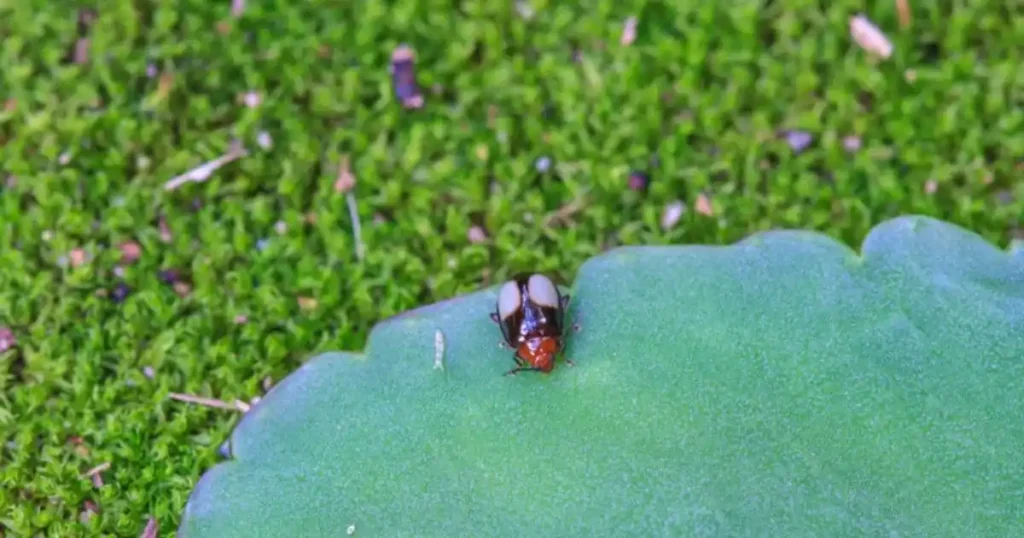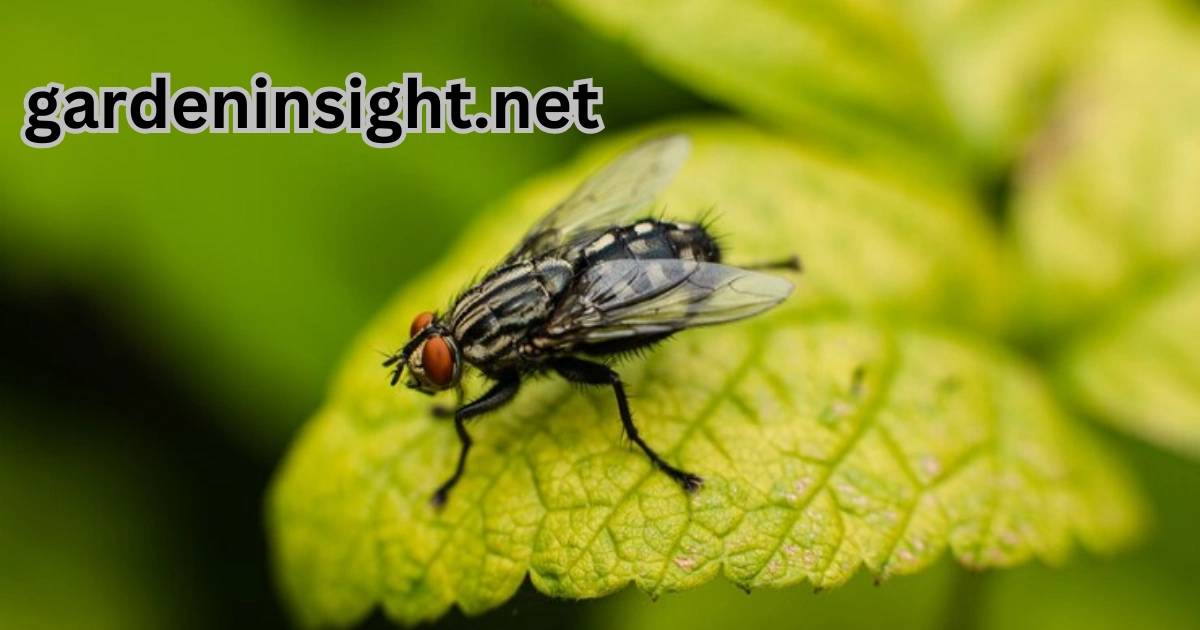Flies buzzing around your garden can be a real nuisance, interrupting your enjoyment of the outdoors and even posing a health risk.
But don’t worry! There are plenty of ways to combat these pesky insects and reclaim your garden as a peaceful haven.
This guide will provide you with a variety of methods to get rid of flies in garden, from natural solutions to DIY traps and preventative measures.
Identifying the Culprit: Types of Garden Flies

Before you wage war on flies, it’s helpful to know what you’re dealing with. Common garden flies include:
- House Flies: These are the most common type, attracted to garbage, pet waste, and decaying organic matter.
- Fruit Flies: Tiny flies that are drawn to overripe fruits and vegetables.
- Fungus Gnats: These small flies thrive in damp soil and can damage plant roots.
- Drain Flies: As the name suggests, these breed in drains and are attracted to standing water.
Why Flies are Attracted to Garden
Flies are attracted to gardens for several reasons:
- Food Sources: Overripe fruits and vegetables, pet waste, and uncovered compost bins provide a feast for flies.
- Breeding Grounds: Damp soil, standing water, and decaying organic matter offer ideal conditions for flies to lay eggs.
- Shelter: Tall grass, overgrown bushes, and cluttered areas provide hiding spots for flies.
How to Get Rid of Flies in Garden Naturally
If you prefer to avoid harsh chemicals, there are many natural ways to get rid of flies in your garden:
- Essential Oils: Certain essential oils, such as peppermint, lavender, eucalyptus, and citronella, repel flies. Mix a few drops of your chosen oil with water and spray around your garden.
- Herbs: Planting herbs like basil, mint, rosemary, and lavender can deter flies with their strong scents.
- Vinegar: Flies are repelled by the smell of vinegar. Fill a small bowl with vinegar and place it near fly-prone areas. You can also mix vinegar with dish soap and water to create a fly trap.
- Venus Flytrap: This carnivorous plant is a natural flycatcher. Place a few Venus flytraps around your garden to help control the fly population.
How to Get Rid of Flies in Garden Soil
Flies breeding in your garden soil can be particularly troublesome. Here’s how to tackle them:
- Keep Soil Dry: Avoid overwatering your plants, as damp soil attracts fungus gnats and other flies.
- Improve Drainage: Amend your soil with compost or other organic matter to improve drainage and prevent waterlogging.
- Neem Oil: Neem oil is a natural insecticide that can help control fungus gnats and other soil-dwelling pests.
- Diatomaceous Earth: This natural powder is made from fossilized diatoms and can kill flies by dehydrating them. Sprinkle diatomaceous earth around the base of your plants.
How to Get Rid of Flies in Garden with Vinegar
Vinegar is a versatile and effective fly repellent. Here are a few ways to use it:
- Vinegar Trap: Mix equal parts vinegar and water in a jar or bowl. Add a few drops of dish soap to break the surface tension. Flies will be attracted to the vinegar, but once they land in the mixture, they’ll drown.
- Vinegar Spray: Mix equal parts vinegar and water in a spray bottle. Spray this solution around your garden, focusing on areas where flies congregate.
How to Get Rid of Flies in Garden in Plant Soil
Dealing with flies in plant soil requires a targeted approach:
- Repotting: If the infestation is severe, repot your plant with fresh soil.
- Hydrogen Peroxide: Mix one part hydrogen peroxide with four parts water and water your plants with this solution. This will kill fly larvae in the soil.
- Sticky Traps: Place yellow sticky traps near your plants to catch adult flies.
How to Get Rid of Flies in Garden Yard with Dogs
Having dogs in your yard can sometimes exacerbate fly problems due to pet waste. Here’s how to manage flies while keeping your furry friends safe:
- Clean Up Pet Waste Promptly: This is crucial to prevent flies from breeding.
- Use Dog-Safe Fly Repellents: Choose natural fly repellents that are safe for dogs, such as citronella or lemongrass essential oils.
- Fly Traps: Place fly traps away from areas where your dogs can reach them.
How to Get Rid of Flies in Garden in Plant Dirt
Similar to plant soil, flies in plant dirt can be controlled with the following methods:
- Allow Soil to Dry: Let the top inch of soil dry out between waterings to discourage flies.
- Introduce Beneficial Nematodes: These microscopic worms prey on fly larvae in the soil.
- Cinnamon: Sprinkle cinnamon powder on the soil surface. Cinnamon acts as a natural fungicide and insecticide.
Additional Tips for Preventing Flies in Garden
- Maintain Cleanliness: Regularly clean up fallen fruit, vegetables, and pet waste.
- Cover Compost Bins: Ensure your compost bins have tight-fitting lids to prevent flies from accessing them.
- Empty Standing Water: Eliminate any sources of standing water, such as birdbaths, buckets, and clogged gutters.
- Keep Grass and Shrubs Trimmed: Regularly mow your lawn and trim bushes to reduce fly hiding spots.
- Use Fly Screens: Install fly screens on windows and doors to prevent flies from entering your home.
DIY Fly Traps
You can easily create effective fly traps using common household items:
- Plastic Bottle Trap: Cut the top off a plastic bottle and invert it into the bottom half, creating a funnel. Fill the bottom with a fly attractant, such as vinegar or fruit juice. Flies will enter the trap but struggle to escape.
- Jar Trap: Fill a jar with a fly attractant and cover it with plastic wrap. Poke small holes in the plastic wrap. Flies will be attracted to the scent and enter the jar, but they won’t be able to find their way out.
Commercial Fly Control Products
If natural methods and DIY traps aren’t enough, you can consider commercial fly control products:
- Fly Sprays: These can provide quick knockdown of flies, but use them cautiously as they can also harm beneficial insects.
- Fly Baits: These attract and kill flies. Place them in areas where flies are a problem, but keep them out of reach of children and pets.
- Electric Fly Killers: These devices use UV light to attract flies and then electrocute them. They can be effective for larger areas.
Conclusion
Dealing with flies in your garden can be frustrating, but with the right approach, you can effectively control these pests and enjoy a fly-free outdoor space.
By understanding the types of flies you’re dealing with, their attractants, and the various control methods available, you can create a comprehensive strategy to keep your garden fly-free.
Remember to prioritize natural solutions and preventative measures to protect the environment and beneficial insects.
FAQs
Some of the frequently inquired questions about ways to get rid of flies in garden are given as follow:
Is there a way to get rid of flies in my garden without harming bees and other beneficial insects?
Yes, there are many natural methods and targeted approaches that can help you control flies without harming bees and other beneficial insects. These include using essential oils, herbs, vinegar traps, and beneficial nematodes.
What is the best way to get rid of fruit flies in my garden?
The best way to get rid of fruit flies is to remove their food source. Pick up any fallen or overripe fruits and vegetables and store them properly. You can also use vinegar traps or fruit fly baits to catch adult flies.
How can I prevent flies from breeding in my compost bin?
To prevent flies from breeding in your compost bin, make sure it has a tight-fitting lid. Turn the compost regularly to speed up decomposition and avoid adding meat scraps or dairy products, which can attract flies.
What are some safe and effective ways to get rid of flies around my garden if I have pets?
If you have pets, opt for natural fly repellents like citronella or lemongrass essential oils. You can also use fly traps, but make sure to place them in areas where your pets can’t reach them. Regularly cleaning up pet waste is also crucial to prevent flies from breeding.
Can I use insecticides to get rid of flies in my garden?
While insecticides can be effective in killing flies, they should be used with caution as they can also harm beneficial insects like bees and butterflies. If you choose to use insecticides, follow the instructions carefully and choose products that are specifically designed for outdoor use.
